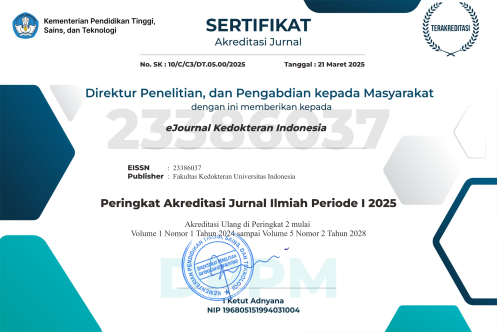Management of Pulmonary Tuberculosis in Patient with Schizophrenia
DOI:
https://doi.org/10.23886/ejki.13.1057.1Keywords:
pulmonary tuberculosis, schizophrenia, drug interactions, medications adherence, case reportAbstract
Schizophrenia affects human cognition, emotion, perception, and other psychosocial skills which is prone to medical noncompliance. Medication adherence or compliance of people with schizophrenia will not be achieved without a shared understanding between professionals, carers and patients regarding medication efficacy, insight, side effects, medication attitudes, and external factors. Recent study found that 32.8% of tuberculosis patients in Indonesia were also managed for psychotic disorders. Furthermore, the treatment coverage of tuberculosis in Aceh Province in 2022 was far below the national average (74,7%), which only reached 52,6%. Rifampicin, a potent anti-tubercular agent, is known to significantly induce several CYP enzymes. As a result, rifampicin may accelerate metabolism of other drugs, in this case antipsychotics, leading to reduced plasma concentrations and potentially diminishing their therapeutic effects. This article reported a case of newly diagnosed pulmonary tuberculosis of a 41-year-old male with schizophrenia in primary healthcare.
Downloads
Downloads
Published
How to Cite
Issue
Section
License
Copyright (c) 2025 Amara Azka Shafrina, Andhika Muhammad Yusuf, Monalisa Fitri Purnama, Intan Chaharunia Mulya, Ghamal Arif Hanafiah

This work is licensed under a Creative Commons Attribution-NonCommercial 4.0 International License.
Accepted 2025-07-22
Published 2025-08-27



